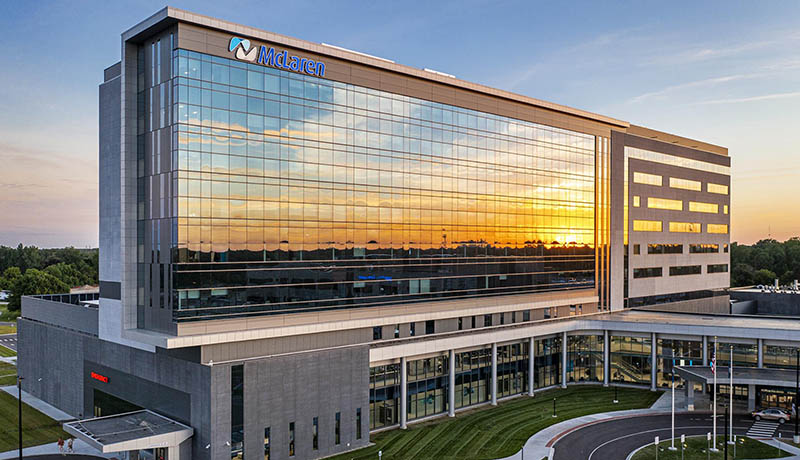Dean's Update 2022-08
August 1, 2022
Following two Michigan State University College of Osteopathic Medicine’s (MSUCOM) spring events – match day and graduation for the class of 2022 – and our welcome and orientation for the class of 2026 is a good time to talk about some of our partnerships and the history MSUCOM has with its associates.
With the March 2022 opening of the new McLaren Greater Lansing Hospital on the MSU campus, we’re kicking off a look at those partnerships with McLaren Health Care. While an official part of our students’ 
Historically, McLaren’s relationships had been with M.D. programs. That would change under the leadership of Phil Incarnati, president and CEO of McLaren Health Care, headquartered in Grand Blanc, Mich.
Incarnati had a history of working with D.O.s earlier in his career when he served as CEO of the Detroit Osteopathic Hospital (DOH). Once at the helm at McLaren, he formulated a growth strategy that included acquiring D.O.-started hospitals. That also opened the door for other partnerships.
Enter the new relationship between McLaren and MSUCOM.
Incarnati explains further how the partnership between McLaren and MSUCOM developed after he took the helm of McLaren in 1989.
“It is true, when I first joined McLaren in 1989, we did not have relationships with D.O. programs, but I did have a history from my time with DOH,” Incarnati said, explaining he understood osteopathy and the benefits it brings to patients and communities. “We found ourselves with a strategy to acquire D.O. hospitals and the unique elements associated with D.O. care.”
He explained the acquisitions were great opportunities for McLaren to add traditional D.O. hospitals into their portfolio at a time when the healthcare organization was growing and these hospitals “were evolving while maintaining their D.O. base.”
Most D.O. hospitals historically were started by physicians, meaning the doctors had buy-in, Incarnati added. “After all, doctors were the founders of these hospitals, and for the most part, D.O.s working in those hospitals had mentors in those hospitals. “
In addition, he said, the students who are attracted to become D.O.s have a buy-in to the difference of what a D.O. provides patients – Osteopathic Manipulative Medicine (OMM), the hands-on approach to diagnosing, treating and preventing illness or injury.
“I like that, from an educational standpoint, osteopathy is not abandoning its roots despite challenges,” he said. “Primary care is the other focus; it’s about identifying with the patients and community. As we partner with MSUCOM, we’re a benefactor of this.”
This is especially important during a time when areas and states struggle to find primary care physicians. The McLaren-MSUCOM relationship has helped meet some of that need with many of our new doctors remaining in Michigan to serve patients in the mitten state.
A look at MSUCOM and McLaren history
In 1997, McLaren acquired Ingham Medical Center and Lansing General Hospital (formerly McLaughlin Osteopathic Hospital); together they would become McLaren Greater Lansing. McLaren’s acquisitions of other hospitals also brought other osteopathic facilities to the McLaren-MSUCOM relationship – Bay Osteopathic, Mt. Clemens General Hospital (Osteopathic) and Pontiac Osteopathic Hospital (POH) became McLaren Bay Region, McLaren Macomb and McLaren Oakland. Together, these four McLaren hospitals are also now part of MSUCOM’s Statewide Campus System (SCS).
McLaren is among the College of Osteopathic Medicine’s SCS group of 30 members across 33 hospitals and six federally qualified health centers, providing educational programs and opportunities for pre-doctoral through postdoctoral, osteopathic interns, residents and fellows. This supports MSUCOM’s mission to “provide world-class, osteopathic, student-centered graduate and medical education and research in order to foster community access to patient-centered medical care.”
McLaren has hospitals across Michigan, as well as in Indiana and Ohio. McLaren retains as many as 50% of graduates going through its programs. “We begin the process of recruiting in the first year,” Incarnati said. “Faculty members know and are integrated enough with us where they’re talking with them (students) and beginning the notion of ‘why go anywhere else when you have the support of this $6.5 billion system.’”
Positive outside influences
Another plus for osteopathic medicine, Incarnati said, is the recent transition to a single accreditation system for graduate medical education in the U.S. The American Osteopathic Association (AOA), the Accreditation Council for Graduate Medical Education (ACGME) and the American Association of Colleges of Osteopathic Medicine (AACOM) now have one accreditation body. ACGME is the nation’s accreditor for osteopathic (D.O.) and allopathic (M.D.) residencies and fellowships.
“Osteopathy is strong and vibrant and not going away,” Incarnati said. “The school’s (MSUCOM) future is very robust. We’re in because we want to be in.”
Going forward
The benefits of the continued partnership between MSUCOM and McLaren are many. One of those is looking toward what still might be on the horizon. “In terms of access, our goal is to have consistent accessible organizations, so there are no differences between Petoskey and Detroit, and we have goals to improve the access for those areas,” Incarnati said. “If you look at (MSU)COM as it continues to grow in applicants, the attraction is still a great ROI for investment of the students. The total number of applications and the quality of the applicants is a great indicator of how they view the college.”
Those outcomes were not lost on McLaren when its new hospital in Lansing was being planned on the westside of MSU’s campus. And the relationship between Incarnati and Dean Andrea Amalfitano continues to strengthen. “Without question, I enjoy working with the dean and his team and there is a great level of trust,” Incarnati said.

Andy Amalfitano
Dean
We will be sharing stories about our many hospital partners over the next several months, highlighting our collaborations and relationships that create numerous opportunities for our students and vital healthcare for the people of Michigan.
